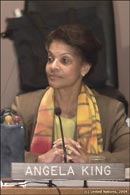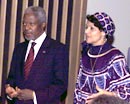A Tribute to Angela King
In her own words
Fifty-second session of the General Assembly
Executive Briefing for the Second Committee, 7 November 1997
Gender mainstreaming: A challenge to business as usual?
[…] No matter how abstract the concepts are that we use either to explain globalization; to track economic growth; to catalogue differences between, and within countries and regions; to serve as a basis for policy development and decision-making: these concepts all have tangible implications for women and men. It is men and women, both, who benefit from, or are disadvantaged by, the actions we take.
View full text (PDF)
Security Council discussion on Women, Peace and Security, 24 October 2000
[…] There can be no peace without gender equality and no development without both peace and equality. Without equal and fair participation of women in decision-making positions in the UN and also in Member States including in this central Organ of the United Nations, we will never achieve the vision outlined in the United Nations Charter.
View full text (PDF)
Afghan Women’s Summit for Democracy, Brussels,
4 December 2001
Statement of Solidarity
[…] I urge you today to join forces and come together as one voice. I understand that there are differences among you, of language, of ethnic background, of education and training, that your experiences have shaped you depending on whether you came here directly from Afghanistan, from refugee camps or from exile in other countries. You may also have differences of opinion among you, and different approaches on how to best address the current situation to determine priorities and to contribute to the peace and reconstruction process, but I appeal to you to adopt a broad-based and inclusive approach in your discussions at this Summit. This two-day window of opportunity is open to you now. I call on you to use it.
View full text (PDF)
World Summit on the Information Society
Second meeting of the Preparatory Committee, 17-28 February 2003
Message
[…] We all recognize that the achievement of gender equality is not solely the responsibility of women – it is the responsibility of all of us, women and men, Governments, international organizations and civil society – and that women’s own initiatives must go hand in hand with a societal commitment to gender equality. Their activities must be matched by governmental actions and initiatives to eliminate discrimination against women, and create an environment where progress towards gender equality is not a daily struggle, but is ensured as a result of explicit and systematic attention to gender perspectives in all activities. The information sector is not exempt from this responsibility.
View full text (PDF)
From Commitment to Action: The Implementation of the Convention on the Elimination of All Forms of Discrimination against Women (CEDAW) in Central and Eastern Europe
Keynote address, Dubrovnik, Croatia, 25-26 October 2003
[…] Implementation of the Convention on the Elimination of All Forms of Discrimination against Women has, in my view, benefited significantly from the complementarity of purpose of the Convention and the Platform for Action, adopted at the Fourth World Conference on Women. …. Important links have been created between the Committee on the Elimination of Discrimination against Women and the intergovernmental policy-making bodies, in particular the Commission on the Status of Women and the General Assembly.
View full text (PDF)
Closing remarks at the thirtieth session of the Committee on the Elimination of Discrimination against Women, New York, 30 January 2004
[…] Among the most satisfying developments over the four-decade period is the steady improvement of awareness of women’s human rights, given a great boost by the Vienna and Beijing International Conferences, by the adoption of the Convention on the Elimination of All Forms of Discrimination against Women (CEDAW) and especially by the work of this Committee. …...
It has been a supreme pleasure and source of encouragement to me to have worked closely with this Committee from February 1996. I have been singularly impressed by the able and astute past Chairpersons, Aída González Martínez, Charlotte Abaka, Ivanka Corti, Salma Khan, Mervat Tallawy, and Desirée Bernard.
View full text (PDF)
Network - The UN Women’s Newsletter
Vol. 8 • No. 1 • January, February and March 2004
From her farewell letter
[…] We have come a long way towards the goal of reaching 50/50 women and men set first by Secretary-General Boutros Boutros-Ghali and then by the Beijing Conference and the General Assembly in 1995 during the Fiftieth Anniversary of the United Nations.
These gains are in no small measure owing to the leadership of the Secretary- General, of many progressive programme managers, male and female, of the persistent advocacy by the Group of Equal Rights for Women in the UN, of changing attitudes, and of mechanisms such as my Office, including the Focal Point for Women, the departmental focal points, the special measures for the achievement of gender equality and accountability mechanisms, such as the gender and human resources action plans.
Despite this notable progress over nearly 40 years, much remains to be done. …. We need to implement a well-known set of formulae: strong commitment and leadership by example in promoting gender equality; real accountability with sanctions and praise; solidarity on the part of women in partnership with like-minded men; workable mentoring schemes at all levels and at all duty stations; compulsory gender-sensitivity training; advocacy and vigilance; and a great deal of coordination and teamwork.
View full text (PDF)
From the panel discussion: Women, peace and posts – in United Nations peace operations, 25 October 2006, New York,
On her role as Chief of Mission in UNOMSA.
[Another] challenge as a woman Chief of Mission was dealing with Headquarters’ hierarchy. Then as now, there lingers in the minds of many male staff as part of the UN culture, the patronizing conviction, subconscious or otherwise, that women are not equal to men especially when it comes to sharing crucial political information. “Need to know" almost always excludes women. While irritating, women, forced to develop a counter-competency, always have a way of finding out what is really important.
I was asked to head the South African mission at 7.30 p.m. one night. I had 24 hours to decide. Having been a leader of a march of students from the University of the West Indies in downtown Kingston to protest the Sharpeville massacre in 1960, and as a Jamaican whose country had initiated the proposal at a Commonwealth Heads of Government meeting to adopt sanctions against South Africa, I had only one answer. Yes. This mission proved to be the most challenging and fulfilling experience of my nearly 38-year career at the UN.
View full text (PDF)


